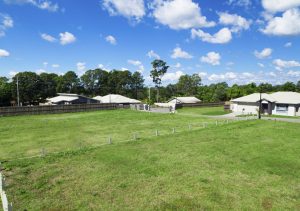Aside from the question of whether the course of action will result in a gain on revenue account (rather than a capital gain), we are aware of a number of instances where it has resulted in the loss of the main residence exemption.
While the main residence exemption can apply to a capital gain from land adjacent to a dwelling, it does so only where the same CGT event happens to both the land and the dwelling.
In Taxation Determination TD 1999/68, the ATO takes the view that the exemption will not apply if:

You dispose of the adjacent land to the same purchaser but at a different time from when you dispose of the main residence, or you dispose of the adjacent land and the main residence to different purchasers even if the disposals happen at the same time.
So, if an LPR were to subdivide some of the land adjacent to the deceased’s dwelling, or they demolished the deceased’s home (to facilitate a future subdivision) the main residence exemption will not apply to any capital gain from the land.
When the CGT provisions were rewritten into the ITAA 1997, the definition of ‘dwelling’ was altered to provide that land immediately under the unit of accommodation was to be regarded as part of the dwelling. The ATO however was quick to point out in Taxation Determination TD 1999/73 that this did not mean that the main residence exemption would apply to a gain from the sale of land that included some land that was previously under a ‘unit of accommodation’.

Paragraph (c) of the definition of ‘dwelling’ in subsection 118-115(1) brings within the definition ‘any land immediately under the unit of accommodation’ only while the land remains immediately under the unit of accommodation. If a unit of accommodation is removed from land and the land is then sold, the land does not come within paragraph (c) of the definition of ‘dwelling’ in subsection 118-115(1).
To alleviate what might be considered to be some of the harshness of these rules, a special rule in section 118-160 applies when a dwelling is accidentally destroyed (for example, in a bushfire) and what was the adjacent land, is subsequently sold. It enables the land to be treated as if the dwelling had not been destroyed.
Feel free to contact our team should you want to discuss this topic further and potentially have clients who may be in this situation.
This publication is not intended to be and should not be used as a substitute for taking taxation advice in any specific situation. The information in this publication may be subject to change as taxation, superannuation and related laws and practices alter frequently and without warning. Neither BNR Partners Pty Ltd, our employees or agents are responsible for any errors or omissions or any actions taken or not taken on the basis of this publication.


